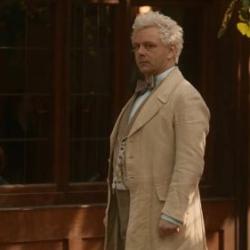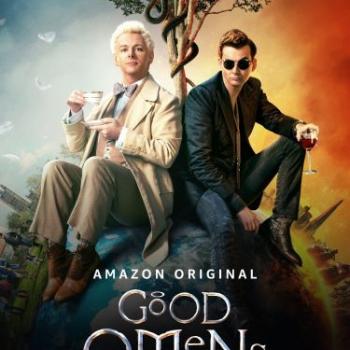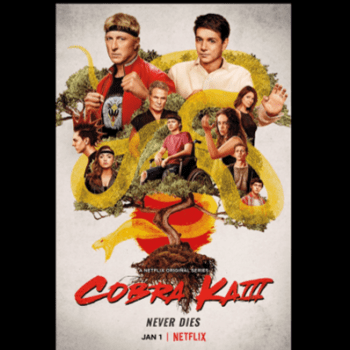How I missed – and then found – the clues to love in Good Omens. All thanks to the Aziraphale and Crowley fandom that opened my eyes.
Spoiler alert: HIGH! Don’t read this essay until you’ve finished the final episode of Good Omens, Season Two!
“Light is the left hand of darkness
and darkness the right hand of light.
Two are one, life and death,
lying together like lovers . . .
like hands joined together,
like the end and the way.”
― Ursula K. Le Guin, The Left Hand of Darkness
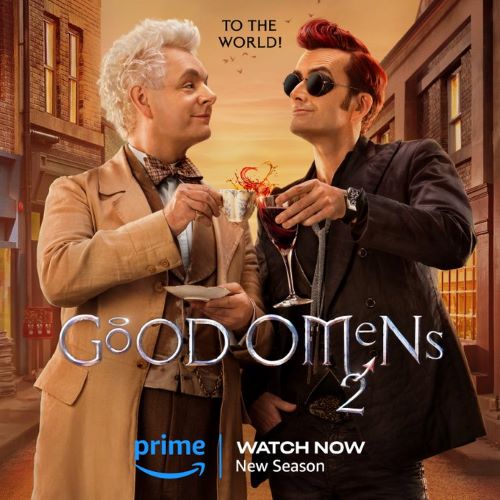
Season One of Good Omens delighted me.
The playful flipping of toxic Christian apocalyptic fiction refreshed me like Eden’s rain dancing on the wings of celestial beings high on a towering wall.
I cheered on the four Lower Tadfield children, The Them – including the prepubescent anti-Christ himself — when they stood up to Satan and the four Armageddon bullies – Famine, Pollution, War, and Death. Those plucky pre-teens destroyed the lie of apocalyptic inevitability with their truth, courage, and goodness.
But what really hooked me was the unlikely friendship and cleverness of an angel and a demon – Aziraphale and Crowley – foiling the factions of Heaven and Hell to prevent Armageddon from ending the world they had come to call home.
“We’ve known each other a long time.”
The Good Omens series, based on the book by Neil Gaiman and Terry Pratchett, traces Aziraphale and Crowley’s partnership through 6,000 years of human history. The series drops us into key moments along the way where they establish their bond while flying under the radar of their respective “employers.” Their surreptitious arrangement to help each other, cover for each other, and come alongside each other in pivotal times of need allows them to find companionship in a liminal and limited place.
The ending of Season One is one of the most satisfying of any series I’ve ever watched. After saving the world, we see that Aziraphale and Crowley are the “angels dining at the Ritz” while “a nightingale sang in Berkeley Square,” as the song goes. They celebrate their success in preventing the catastrophic supernatural battle and toast the world that has become the fragile place of their friendship over these many millennia.
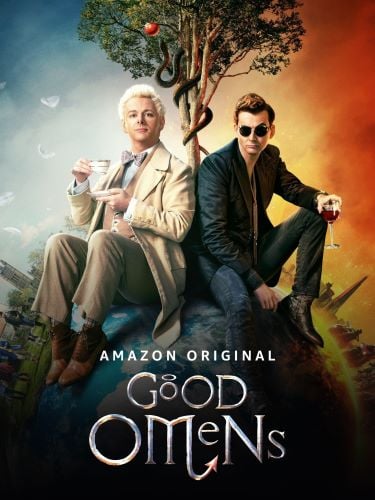
But Season Two of Good Omens did something to me that I’m still trying to understand.
It didn’t start out that way. Episode One finds Aziraphale and Crowley reasonably adjusted to their new lives, each a persona non grata to their respective sides. But when the Archangel Gabriel shows up at the bookshop with amnesia, Aziraphale and Crowley must work together to hide him from Heaven and Hell. Let the celestial antics begin!
But then Episode Two took me to a place of biblical, moral, and ethical depth that I did not expect. The flashback in this episode places Aziraphale and Crowley in the story of Job, the righteous man afflicted by Satan in order to test his faith in a bet with the Almighty. Both Aziraphale and Crowley find themselves torn between the will of their two factions – Heaven and Hell – that tests their own faith as well.
In that testing, they each do something that compromises the roles assigned to them by their superiors. But they do it because they know that protecting those who are innocent and vulnerable is a higher moral good than any loyalty to their respective dominions. Together, they are able to thwart the absurd destructive whims of the cosmic powers.
However, rule-following, righteous Aziraphale is distraught by his actions.
He lied. And he is prepared to join Crowley as a fallen angel in the depths of Hell as a consequence of his disobedience. At first, Crowley can’t believe that this is what his friend thinks he’s there to do – to basically arrest him and strip him of his angelic status. But his chuckling incredulity quickly gives way to sincere compassion. He assures Aziraphale that he won’t tell anyone and that “nothing has to change.”
At first, Aziraphale looks relieved. Yet he questions his identity since he is neither a true angel nor a demon. “But what am I?” he asks.
Crowley gives him the answer that he gave himself when trying to figure out his own place as a displaced being: “You’re an angel/demon who goes along with Heaven/Hell as far as he can.”
The scene ends with the two of them sitting side by side on a cliff overlooking the sea. Much the same way that they once stood atop the wall of Eden looking out on a desert. And the way they floated together in a newly-birthed cosmos looking out at the glowing nebula.
Amidst a star-fall, Crowley extended a protective wing over Aziraphale.
Amidst a rainfall, Aziraphale umbrellaed his wing over Crowley.
But here, amidst the fall of certainty, security, and self-understanding, there are no wings.
There is no feel-good resolution or light-hearted laughter. And there is certainly no clinking of glasses.
But what remains is solidarity and the beginning of a deep and abiding trust that will sustain them for thousands of years. There is a willingness to sit in the fragility of not-knowing, together. Because even in this precarious place, they have learned something about themselves and each other.

They are a true yin and yang, the symbol of interconnected, interrelated forces in which light has an eye of darkness, and darkness has an eye of light.
As author Ursula K. Le Guin described it in her book, The Left Hand of Darkness: “Light is the left hand of darkness and darkness the right hand of light.”
It was then that I realized: we are in a different story.
Or, rather, that Neil Gaiman has taken us to a deeper level of the Good Omens saga than I had suspected was there.
And, because I am an ordained minister and seminary professor who wrestles daily with the complexities of biblical texts and ethical issues, this was a story that had much more meaning for me beyond an entertaining anti-apocalyptic romp. The epic of Aziraphale and Crowley is an archetype for the struggle to find meaning, define oneself, and seek connection in a “pointless” (as Crowley described it) clash of powers.
I can’t say enough here about Michael Sheen and David Tennant in their portrayal – no, their complete embodiment – of Aziraphale and Crowley. In that scene, these two actors moved us from a charmingly mismatched buddy-buddy tale to a profound complexity that redefined their relationship in my eyes.
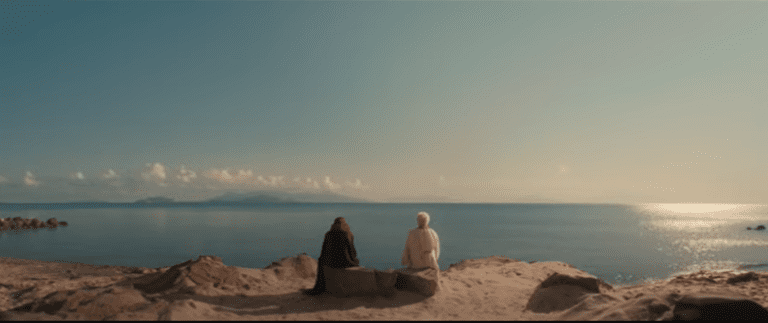
Shades of grey
Episodes 3 and 4 further flesh out this relationship. In 1827 Edinburg, we see Crowley challenging Aziraphale’s naïve and, frankly, privileged framing of what is “right” and “wrong.” Aziraphale begins to grasp that the criteria for determining what is “good” and “bad” is more often a matter of situational ethics than a strict dualistic morality defined by those in charge.
And after the harrowing bullet-in-the-teeth trick and slight-of-hand photo swap in Episode 4, the two are back to clinking glasses. “I knew you would come through for me,” says Aziraphale. “You always do.”
“Well, you said ‘trust me,’” Crowley replies, sipping his wine.
“And you did,” Aziraphale says with blushing affection. They both agree that “shades of grey” are preferable to “black and white” when it comes to determining what is good and what is evil.
Matchmaking misadventures
These stories are interwoven with the current timeline of Aziraphale pursuing “clues” to help them figure out what happened to Gabriel and how best to help him. In the meantime, both Aziraphale and Crowley scheme to find ways to make Maggie and Nina, fellow shop owners on Whickber Street, fall in love so that they can explain away the miracle energy that erupted from disguising Gabriel.
When Crowley’s “Vavoom” scheme goes over like, might we say, a water balloon, Aziraphale hatches an elaborate scheme to bring them together in a Jane Austen-style ball. Then, when the minions of Hell attack the bookshop, they struggle together to defend the humans and get to the bottom of the mystery around Gabriel that threatens to once again trigger an inter-cosmic war.
And, sure enough, they succeed, each of them drawing on their own skills, ingenuity, cleverness, and courage to stop the seemingly immanent battle. When the dust settles, the Metatron takes Aziraphale for a “chin-wag.” Meanwhile, Nina and Maggie have their own sit-down with Crowley to encourage him to be forthright with Aziraphale about their relationship – instead of trying to mess with theirs.
I wasn’t prepared for the end of Episode Six.
Here’s where I could feel my brain pushing back against the hint that there might actually be a romantic connection between the two. “Don’t ruin a perfectly good friendship!” I practically yelled at the screen near the end of Episode 6 as I realized that Crowley was about to reveal his true feelings to Aziraphale.
And then I watched, heart tightening, as the angel and the demon pleaded with each other to do the one thing neither of them could do in order to be together. I will explore this tension in a future piece. But for now, I’ll just say that Aziraphale and Crowley are caught in a no-win situation that forces them apart precisely because of who they understand themselves to be. And this no-win situation is because there is a system of power in place that cannot let them be who they are, neither individually nor together.
Yet, in a final desperate moment of despair and passion, Crowley grabs Aziraphale by the lapels and kisses him. With a tragic chorus of voices and violins swelling to a fevered pitch, that 12.44-second kiss changed everything for me.
And then it all fell apart.
With an incongruous and wounding, “I forgive you,” “Don’t bother,” a lone violin laments lost love as the two separate from each other with more pain than the worst tortures of Hell.
When the episode ended with Aziraphale ascending vertically and Crowley speeding off horizontally, the world stopped, my heart cracked, and I have not been the same since.
What just happened? How did I not see this coming? Why was I so shocked? And what was happening to me?
Before I go further, I need to clearly state my own positionality, because I think it helps explain why I was not prepared for what happened. And, why I was initially resistant to a truth that, I have now learned, was apparent to many fans all along.
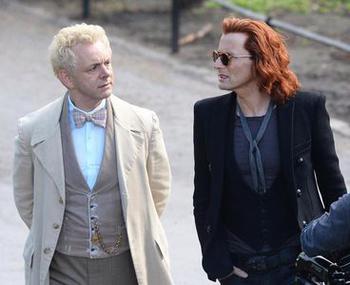
I am a cisgender heterosexual female. Yet I consider myself an ally of those who are LGBTQIA+. As an ordained minister, I have performed a gay marriage ceremony with complete joy. Many of my dearest friends are gay or lesbian. I have worked to educate my students and pastoral colleagues about ways in which the church can be welcoming, affirming, and empowering of those who are LGBTQIA+.
But the bottom line is that I am not queer. I see the world through hetero eyes. Which means I miss a lot of the clues and queer nuances that are right in front of me.
The spell of cisgender-heteronormativity is not easily broken.
There is a scene in Good Omens 2 when Aziraphale and Crowley take hold of Gabriel’s hands and perform a miracle that obscures his true identity from the eyes of Heaven and Hell. They know their trick has worked when other angels and demons look right at him and simply do not recognize him.
With his memory mysteriously vanished, the archangel doesn’t even recognize himself. But he knows that his name is Gabriel because that is what Aziraphale and Crowley call him (despite his temporary moniker of “Jim”).
When he hears certain visitors are looking for Gabriel, he cheerily announces, “people sometimes call me Gabriel.” In episode six, when he realizes that the demons intend to destroy the bookshop and kill the people in it, he even appears in fabulous-fuzzy raiment and insists he is, in fact, Gabriel, the one whom they seek. But they don’t believe him.
Their eyes simply cannot recognize his true identity.
It’s only when Beelzebub, the Duke of Hell, coaxes one of their flies to burrow into his eye (yes, I know, very cringe) that he finally sees. He is transported back through a tunnel of memories and dropped into scenes that reconstruct what has happened to him.
What he learns – and we learn along with him – is that there were clues all along that explain who he is. And what he did to end up naked as a newborn baby with a cardboard box on Aziraphale’s doorstep. And – most importantly — who he truly loves.
Gradually, we realize that he loves Beelzebub. Gabriel the Archangel of Heaven has fallen in love with Beelzebub the Duke of Hell.
They had been meeting surreptitiously for years to conspire against the plan of Heaven and Hell to restart Armageddon and engage the final battle that will end the world.
Little by little, they have built a relationship of trust that blossomed into love. They have their own song. They help each other in creative and tender ways. (Sound familiar?)
But when it becomes clear that the powers of Heaven plan to erase his memory and relegate him to the lowest rung in the celestial hierarchy, he hides his memory in Beelzebub’s tiny, essential gift – a teensy, delicate fly.
Looking back, I now realize that Crowley and Aziraphale’s kiss was like Gabriel’s fly for me. It burrowed deep into my eyes, my brain, and my heart, sending me spinning down a tunnel from which I have not yet emerged.
I knew I had to find the clues and solve the mystery of Aziraphale and Crowley’s relationship.
So, I went back to watch the Good Omens series from the beginning.
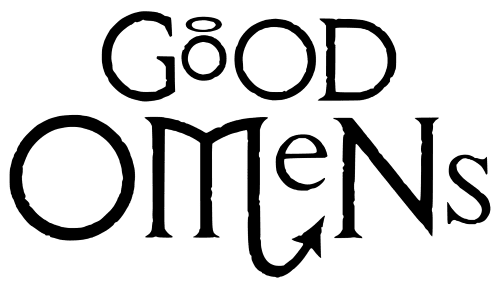
I had to re-examine every episode to figure out what I’d missed.
At the same time, I found Twitter and YouTube accounts that, much to my surprise, were even more obsessed with Aziraphale and Crowley than I was! I discovered fan art, fan fiction, and fan conversations with Neil Gaiman himself!
I learned about terms like “AU” (alternate universe where people imagine different scenarios for the characters).
And “moots” – mutual followers on the internet who share a love for actors, musicians, celebrities or shows like Good Omens.
And “headcanon,” a term used to describe someone’s personal interpretation of or belief about the details of a fictional story that aren’t part of the “official” account.
What the Good Omens fandom taught me.
It never ceases to amaze me the way Good Omens fans parse the plot, the scenes, the characters, and every nuance of Good Omens like I’ve seen biblical scholars dissect esoteric passages of scripture.
Accounts like A.Z. Fell & Co., angelleisabelll, swirlingthings, flood crowley enthusiast, mimi the ineffable era, ghosty, earthisalibra, azriacrow, and youryurigoddess on Twitter, and Sandarya’s Youtube channel are fountains of analysis, information, art, and sometimes just plain virtuosic silliness.
Good Omens fans are fastidious, sharp-eyed, and extremely attuned to things like neurodivergent coding and queer-coding – things I had missed on a first viewing.
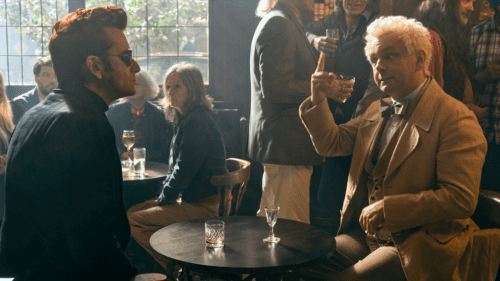
One article in particular revealed to me that my inability to see what was right in front of me with Aziraphale and Crowley was due to my limited perspective. “Smited, Smote, Smitten: A Reading on Queer Longing in Good Omens,” by Maya Gitelman deconstructed and then reconstructed my experience with Good Omens. I’ll quote just one snippet here:
Queer love can heal and hurt in ways the cishets can’t imagine. The pain of this finale is exquisite, because Aziraphale never could have hurt him so mortally if they hadn’t been so deeply in love. I trust that the intentional storytelling devoted to shattering them so specifically will do justice to putting them back with care.
Gitelman’s essay shattered my cishet perspective and allowed me to rebuild a different frame for understanding what was happening between Aziraphale and Crowley, something that I simply could not recognize at first.
It gradually dawned on me that the reason I had missed so much about Aziraphale and Crowley was precisely because I see the world from a cishet perspective.
Which means that I’m often clueless and overlook important things. So, even though I consider myself an ally, this experience is reminding me that allyship alone is not enough. I need to listen, learn, get out of the way, and let the fly burrow into my eye.
Michael Sheen and David Tennant
The other thing I discovered in the Good Omens labyrinth is that Michael Sheen and David Tennant are wholly engaged with the Good Omens fandom. Michael Sheen interacts with fans on Twitter and is a stunningly talented, really funny, and really good human. And while David Tennant isn’t active online, the videos of him talking with fans at conventions and public events show his genuine care and encouragement of people who have found inspiration in Aziraphale and Crowley. He, too, is really talented, really funny, and a really good human.
The more I read and watch, the more I realize that their unparalleled acting skills – combined with their support for the LGBTQIA+ community – have been enormously important for fans who saw so many themes and queer-coding that affirmed their identity, worth, and value.
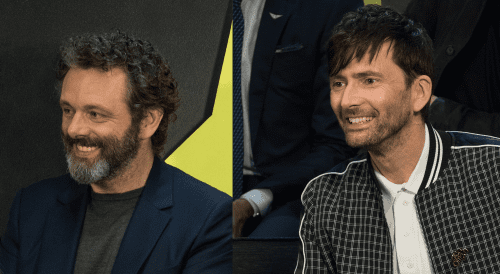
And, incidentally, David interviewed Michael for a podcast right before the Good Omens series premiered in 2019. Michael called it “the new love story for the 21st century” (minute mark 15:11). Indeed.
So why am I in love with Aziraphale and Crowley?
Even though I have not experienced the resonance of Good Omens the same way as someone who is queer, I do know what it feels like to experience that first crush under a starlit sky.
I know what it’s like to have someone do something so generous and selfless and thoughtful that they broke me open the way Crowley did with Aziraphale, handing him a bag of precious books saved from destruction.
I know what it’s like to have those private jokes and knowing looks. I have experienced what it’s like to find a companion in the loneliness of being untethered. I know what it is to be deeply hurt by someone who loves me – and to have been the one that does the hurting.
And I know what it’s like to yearn for someone who is so, so far away.
We, the fandom, now share in that heartbreak and yearning.
While it seems certain that Amazon and BBC will renew Good Omens for a third (and probably final) season, it may be years until we see Aziraphale and Crowley again. No matter. The Good Omens fandom appears ready to keep their torches lit with drawings, videos, pics, fan fiction, analysis, and endless speculation about what might happen in Season 3.
Neil Gaiman has given us three words for what to expect: big, loud, final.
So, while we wait, I’ll attempt my own headcanon.
What I would love to see in Season 3 is for Neil Gaiman to bring back all the characters who Aziraphale and Crowley have helped over the past 6,000 years. And have them come together on a mission to bring the angel and demon back together again. Nina and Maggie. The merchants and shopkeepers of Whickber Street. Wee Morag and Elspeth. Job and his family. The Them, including Adam the no-longer-anti-Christ. And, yes, Gabriel and Beelzebub.
I want Aziraphale and Crowley to see that there are others who are pulling for them, supporting them, and even willing to fight for them so that they can be who they are and love each other without fear.
In other words, the love that rippled out from the two of them at the beginning – which saved so many people and touched so many lives – I want to see that love flow back to them and all around them. I want to see them encircled by a community of acceptance, fierce protection, and unconditional compassion. I want the community to stand between Aziracrow and Metatron with a defiant “You’ll have to go through us to get to them.”
Aziraphale and Crowley have had to go it alone together throughout their existence.
It’s too much for two people to bear by themselves. They’ve had to keep their love a secret, even from themselves. They’ve been hiding it from those who can hurt them and remove them from the Book of Life. No matter how strong their love for each other may be, it’s impossible to withstand the opposing forces of their respective tribes all alone.
The same holds true for any person, any couple, who has had to hide who they truly are. They need solidarity and fearless love from a community in which they can root and grow.
For all those who are made to believe that who they are is wrong, evil, disgusting, deviant, abnormal, polluting, or a problem for others – what I see in Aziraphale and Crowley is the assurance that you are beloved.
Here’s the thing. Those who are deemed “deviant” because of who they are or who they love are are not the source of our social ills. They are often the ones who hold the key for human survival and flourishing.
They are the ones who can teach us about beauty, joy, self-sacrifice, courage, and love in ways that are expansive beyond measure and, well, ineffable.
Just like Aziraphale and Crowley.
Check out Part One of my Good Omens trilogy:
Good Omens: An Antidote to Toxic Christian Apocalyptic Fiction
And here’s Part Three:
Aziraphale’s Choice: The Tragic Theology & Ecclesiology of Good Omens
Also, check out this excellent essay, “Why There’ll Never Be Another Good Omens 2 Experience,” by Julia Dovey for an analysis of why the saga of Aziraphale and Crowley is so powerful and compelling.
And here is a podcast conversation I did about Good Omens on Positively Joy: https://open.spotify.com/episode/4y0gv6KEaBchQUBII2wcZY
Read also:
The Healing Power of “Moonlight”: Race, Erotic Love, and Baptism
The Pastor of Cobra Kai – Surprising, Relevant & Redemptive

The Rev. Dr. Leah D. Schade is the Associate Professor of Preaching and Worship at Lexington Theological Seminary in Kentucky and ordained in the ELCA. Dr. Schade does not speak for LTS or the ELCA; her opinions are her own. She is the author of Preaching in the Purple Zone: Ministry in the Red-Blue Divide (Rowman & Littlefield, 2019) and Creation-Crisis Preaching: Ecology, Theology, and the Pulpit (Chalice Press, 2015). She is the co-editor of Rooted and Rising: Voices of Courage in a Time of Climate Crisis (Rowman & Littlefield, 2019). Her newest book is Introduction to Preaching: Scripture, Theology, and Sermon Preparation, co-authored with Jerry L. Sumney and Emily Askew (Rowman & Littlefield, 2023).




